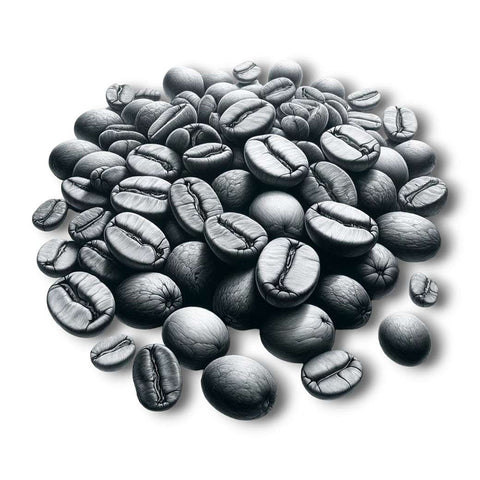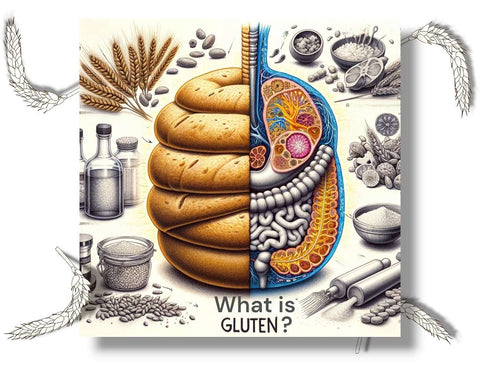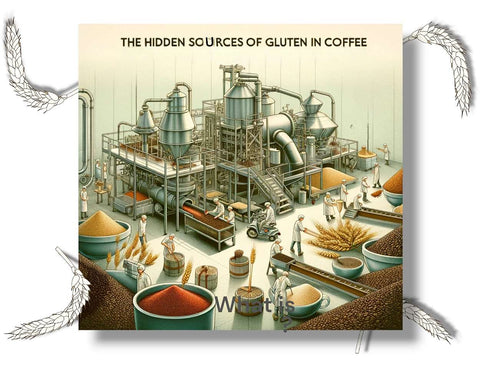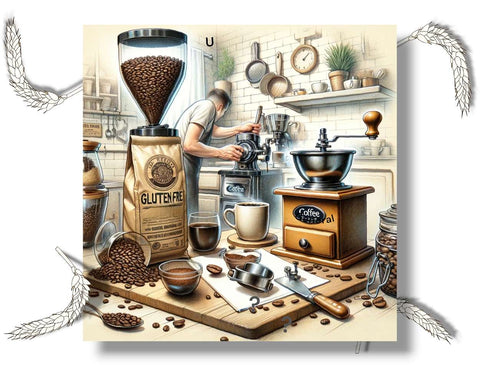What is Gluten-Free Coffee for Celiacs?
Introduction to Gluten-free Coffee & Celiac Disease

Are you a coffee lover who also happens to have celiac disease? If so, you've come to the right place. In this ultimate guide to gluten-free coffee, we'll show you how to satisfy your caffeine cravings without compromising your health.
For those with celiac disease, consuming gluten can trigger a range of unpleasant symptoms, including digestive issues and fatigue. So, it's crucial to ensure that every aspect of your diet is gluten-free – including your beloved cup of joe.
In this comprehensive guide, we'll cover everything you need to know about gluten-free coffee. We'll explore the potential sources of gluten in coffee and reveal some surprising ingredients to be aware of. We'll also dive into the world of gluten-free coffee alternatives, from certified gluten-free brands to DIY options.
Whether you prefer a classic cup of black coffee, a frothy latte, or a refreshing iced brew, this guide has got you covered. Get ready to learn all the tips, tricks, and recommendations to enjoy your favorite caffeinated beverages without compromising your gluten-free lifestyle. So, let's brew up some knowledge and sip our way to gluten-free satisfaction!
Understanding Celiac Disease and Gluten Intolerance

Celiac disease is an autoimmune disorder that affects the small intestine, impacting approximately 1% (or 1 in every 100 individuals) of the global population according to the Celiac Disease Foundation [1]. When individuals with celiac disease consume gluten, their immune system attacks the lining of the small intestine, resulting in damage and various symptoms. Gluten is a protein found in wheat, barley, and rye, and it can be present in many processed foods and beverages, including some coffees.
What is Gluten and Why is it a Concern for Celiac Disease?

Gluten is a mixture of proteins that gives elasticity to dough, helping it rise and maintain its shape. For individuals with celiac disease, gluten triggers an immune response that damages the small intestine and inhibits the absorption of nutrients, as detailed by the Mayo Clinic [2]. This can lead to a range of symptoms, including abdominal pain, bloating, diarrhea, fatigue, and even malnutrition.
Gluten is a composite of storage proteins found in wheat, barley, rye, and their derivatives. In baking, gluten is the key to dough's elasticity, helping it rise and maintain shape, while also contributing to the chewy texture of bread products. For most people, gluten is a harmless component of their diet. However, for individuals with celiac disease—an autoimmune condition—consuming gluten triggers an immune response that damages the lining of the small intestine. This damage impedes nutrient absorption and can lead to various symptoms ranging from abdominal discomfort and bloating to severe malnutrition and intestinal damage over time.
Moreover, gluten sensitivity, distinct from celiac disease, affects individuals who experience similar, though typically less severe, symptoms upon consuming gluten but do not test positive for celiac disease. Understanding the nuances of gluten's impact on health is crucial for managing symptoms and maintaining well-being for those affected.
The Hidden Sources of Gluten in Coffee

While coffee itself is gluten-free, the way it is processed and served can introduce gluten into your cup. One of the potential sources of gluten in coffee is cross-contamination during production, a concern supported by findings in a study on food safety and cross-contamination published in the National Institute of Health (NIH) PubMed Library [3]. Coffee beans are often processed in facilities that also handle grains containing gluten, which increases the risk of contamination. Additionally, flavored coffees, such as those with added syrups or spices, may contain gluten-containing ingredients.
Cross-Reactivity Concerns

An emerging concern for those with celiac disease and non-celiac gluten sensitivity is the concept of cross-reactivity, particularly in relation to coffee consumption. Cross-reactivity occurs when the immune system mistakes the proteins in one substance (like coffee) for gluten proteins, leading to an immune response as if the individual had consumed gluten. While scientific studies, such as those reviewed by the National Institutes of Health (NIH), on this phenomenon are limited and the evidence is not conclusive, some individuals report experiencing symptoms of gluten exposure after consuming coffee.
The theory suggests that certain proteins in coffee could be structurally similar to gluten proteins, triggering this response. However, it's important to note that current research does not definitively support widespread cross-reactivity between coffee and gluten. Individuals concerned about potential reactions should consult with healthcare professionals to tailor their diet to their specific health needs, possibly considering an elimination diet to pinpoint the cause of their symptoms.
For those looking to minimize any risk, opting for pure, unflavored coffee and ensuring that the coffee-making equipment is free from gluten contamination are practical steps. Additionally, engaging with a dietitian or a healthcare provider knowledgeable about celiac disease can provide personalized advice and guidance.
Testimonial from a Satisfied Customer:
'I’ve tried several gluten-free coffee brands, but none compare to the rich taste and aroma of General Warfield’s Coffee. It’s the only coffee that doesn’t trigger my gluten sensitivity, and it’s become an essential part of my morning ritual.’ - Becky L., loyal customer
Gluten-Free Coffee Brands and Options

For coffee lovers with celiac disease, finding the best gluten-free coffee brands for celiacs is crucial for ensuring their health and enjoyment. Fortunately, the market today offers a variety of gluten-free coffee brands, catering to the diverse preferences and needs of individuals with gluten sensitivities. While several brands take extra precautions to ensure their coffee is free from gluten contamination, General Warfield’s Coffee also stands out for its commitment to quality and flavor.
To assist you in navigating the wide array of options, it’s beneficial to know what criteria to look for in a gluten-free coffee. Beyond seeking brands that explicitly state their products are gluten-free or certified gluten-free, consider the transparency of their sourcing and processing practices. A commitment to preventing cross-contamination and ensuring the purity of the coffee at every stage of production is paramount. This guidance is not exclusive to General Warfield’s Coffee; it is applicable across many specialty grade brands. By sharing this information, we underscore our dedication to your health and satisfaction, reaffirming that while we strive to be your top choice, your well-being is our primary concern.
Acknowledging the wide array of gluten-free options available, we pride ourselves on setting a new standard for what coffee lovers can expect. Unlike many gluten-free coffees that compromise flavor for safety, General Warfield’s Coffee refuses to accept such compromises. Our innovative roasting technique not only guarantees a gluten-free cup but also enhances the coffee's natural aromas and flavors. This dedication to excellence ensures that choosing General Warfield’s Coffee is not about settling for a limited option but about choosing the best in a broad market of gluten-free products.
When shopping for coffee, look for options that are labeled as "gluten-free or certified gluten-free," to guarantee they meet the strictest standards. Also, consider trying single-origin coffees and specialty blends from reputable brands that share a dedication to quality and safety.
How to Make Your Own Gluten-Free Coffee at Home

If you prefer to make your own coffee at home, there are several steps you can take to ensure that it is gluten-free. Start by choosing whole bean coffee that is labeled as gluten-free or certified gluten-free. This reduces the risk of cross-contamination during processing. Then, grind the coffee beans yourself to avoid any potential sources of gluten. Finally, make sure your coffee-making equipment, such as your grinder and coffee maker, are thoroughly cleaned and free from any gluten residue.
Brewing the perfect cup of coffee at home doesn't have to be complicated, even when ensuring it's gluten-free. Here are some gluten-free coffee brewing tips to help you enjoy your caffeine fix safely.
Helpful Tips:
1. Start with the Right Beans:
Select specialty-grade whole bean coffee that is gluten-free or carries a certified gluten-free seal. Choose brands that are reputable, trustworthy, and transparent. General Warfield's Coffee provides a variety of options that meet these criteria and are artisan-roasted for optimal flavor and purity.
2. Keep It Clean:
Make sure your coffee-making equipment, such as grinders and coffee makers, is thoroughly cleaned to avoid any gluten cross-contamination. This is especially important if the equipment is used to prepare other food or beverages that may contain gluten.
3. Brewing Method Matters:
Different brewing methods can highlight unique flavors and qualities of your coffee. Experiment with pour-over, French press, or a simple drip coffee maker to find your favorite method. General Warfield’s provides specific brewing guides for each of our blends to help you achieve the perfect cup every time.
Tips for Ordering Gluten-Free Coffee at Cafes and Coffee Shops

When ordering coffee at cafes or coffee shops, it's important to communicate your gluten-free needs clearly. Start by asking if they have any gluten-free coffee options available. If they do, inquire about their preparation methods to ensure there is no risk of cross-contamination. If gluten-free options are not available, consider ordering a black coffee or a plain latte made with dairy milk. Avoid flavored syrups and toppings, as they may contain gluten.
Exploring Gluten-Free Coffee Alternatives, Such as Herbal Tea and Matcha

If you're looking to switch things up or take a break from coffee, there are plenty of gluten-free beverage alternatives to explore. Herbal teas, such as chamomile, peppermint, or ginger, are naturally gluten-free and offer a soothing and caffeine-free option. Matcha, a powdered green tea, is another great alternative that provides a boost of energy without the jitters. These alternatives can be enjoyed hot or iced, and they offer a wide range of flavors to suit your taste preferences.
The Benefits of Drinking Gluten-Free Coffee for Celiacs

Choosing gluten-free coffee can have several benefits for individuals with celiac disease. By eliminating gluten from your coffee, you can reduce the risk of triggering unpleasant symptoms and digestive issues. Additionally, gluten-free coffee options are often produced with stricter quality control measures, ensuring a safer and more reliable product. Finally, enjoying a cup of gluten-free coffee can provide a sense of peace of mind, allowing you to savor your favorite beverage without worrying about its impact on your health.
Gluten-Free Coffee Recipes and Ideas

If you're feeling adventurous, there are plenty of gluten-free coffee recipes and ideas to try at home. From dairy-free lattes made with nut or oat milk to homemade coffee syrups using natural ingredients, the possibilities are endless. You can also experiment with different brewing methods, such as pour-over or French press, to discover new flavors and aromas. Get creative and have fun exploring the world of gluten-free coffee in your own kitchen.
Conclusion: Embrace the Purest Cup with General Warfield’s Coffee
As a coffee aficionado navigating a gluten-free lifestyle, you don't just deserve any coffee; you deserve the best—Choose General Warfield’s Coffee. Our dedication to quality and purity sets us apart in a sea of options. With every bean meticulously selected and artisan-roasted in our award-winning, FDA-approved facility, we promise a cup that’s not only safe for those with celiac disease but unparalleled in taste and quality.
In a world where choices abound, General Warfield’s Coffee emerges not just as another option but as the premier choice for those who value both their health and their coffee experience. Our selection process, artisan roasting techniques, and rigorous quality control measures are designed to meet the needs of individuals with celiac disease or gluten sensitivity without sacrificing taste or quality.
While we celebrate the variety of gluten-free coffee options available today, we invite discerning coffee lovers to experience the unmatched purity and flavor that General Warfield’s Coffee offers. Join us in embracing a cup of coffee that stands tall among many, assured that with every sip, you’re enjoying not just any coffee, but the culmination of dedication to excellence and a commitment to the gluten-free community.
Ready to elevate your coffee experience with peace of mind? Indulge in General Warfield’s Specialty Grade Gluten-Free Coffee. Taste the difference quality makes and enjoy every sip without worry. Click here or click the image below to discover your new favorite brew and join the General Warfield’s family today!
References:
1. https://celiac.org/about-celiac-disease/what-is-celiac-disease/#:~:
text=It%20is%20estimated
%20to%20affect,that%20attacks%20th
2. https://www.mayoclinic.org/diseases-conditions/celiac-disease/symptoms-causes/syc-20352220#:
~:text=If%20you%20have%20celiac%
3. Nutrients. 2021 Jul; 13(7): 2244.Published online 2021 Jun 29. doi: 10.3390/nu13072244
PMCID: PMC8308338P
MID: 34210037





Leave a comment